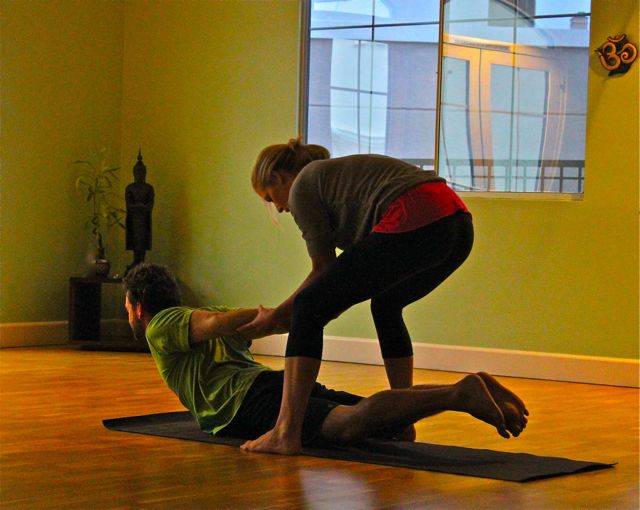On the heels of the John Friend scandal and the New York Times article about yoga injuries, I got to thinking about who should be allowed to teach yoga.
There are teachers who go the traditional route and find a Yoga Alliance approved school (RYS), clock in their 200 hours, and go on their merry way to teach others. Some teachers follow their guru around and learn by osmosis without an official certificate. Others attend weekend trainings and after a few hours call themselves yoga teachers. Then there are the online certification programs.
Yoga Alliance has taken a lot of heat in the past as a national organization that is trying to keep the integrity of yoga in a systematic way. However, monitoring the quality of teaching in the US is extremely challenging. How can one organization keep everyone accountable for the hours? It would also take an enormous amount of time and one-on-one contact between the organization and its teachers to ensure proper skill set and technique.
When I finished my training along with 25 other students, I felt completely lost. I paid Yoga Alliance their fee, sent in my certificate and they promptly sent me back my RYT number. I didn’t feel equipped enough to start teaching, but I did anyway. For an entire year I taught 16 classes a week and what I didn’t learn in teacher training, I learned through experience. However, it was up to me to keep the learning going. I took workshops, attended trainings, retreats, conferences and consulted hundreds of yoga books.
So why are there so many mediocre yoga teachers out there and what can we do about it?
There are some people who take a job for the money or because it’s just another way to get by. If you are not passionate about what you do, you will not be good at it and you will definitely not care if you suck or not. Being a good teacher is about walking the talk and only teaching what you know, whatever comes from direct experience. Regurgitating someone else’s dogma is empty. Being an authentic yoga teacher requires dedication, honesty and practice. For the sake of your students, it is up to you as a teacher to strive for constant improvement and adhere to the eight limbs of yoga.
Students, on the otherhand, need to keep an eye out for inexperienced teachers, especially when dealing with advanced postures and adjustments.
- If a class feels disconnected and awkward, pay even more attention to your breath and inner guide.
- Don’t be afraid to speak up if you are receiving a bad adjustment. If you sense that the teacher isn’t confident and comfortable, just say “no thanks.”
- Look for teachers who never exhibit signs of superiority or grandiosity. Ego guided practices lack intuition and can lead to overworking or injury.
- Make sure the style of yoga you are practicing speaks to you on a deeper level. Yoga is not just about movements and poses and it takes an experienced teacher to integrate ancient philosophy into the practice. This is the only way yoga will begin to manifest as change in your daily life.
- Beware of teachers who are threatened by your yogic developments – especially in regard to teacher training. Teachers who don’t want you to try other styles of yoga or who only want you to practice with them are missing the point. If you are a teacher of teachers then your goal should be to create better teachers than yourself. Otherwise we give in to an ego driven desire to keep others beneath us.
We may not be able to do much about the type of teachers that are out there but we do have control over who we choose to practice with. Remember to never give up your own power, for the true teacher lies within.


Leave a Reply
You must be logged in to post a comment.